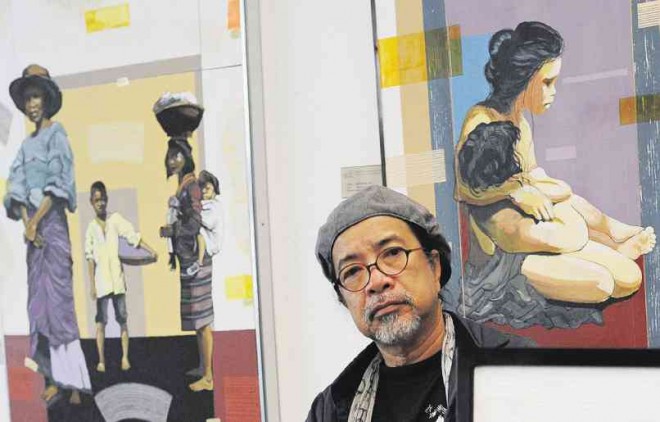He uses art to capture slices of Filipino life

HIS COLLEAGUES say Benjie Mallari’s work is linked with the best journalistic outputs of Ang Pahayagang Malaya during martial law. EV ESPIRITU
BAGUIO CITY-based Benjie Mallari is known as an artist who came up with powerful editorial cartoons, sketches and caricatures during the Marcos dictatorship for the Sunday Malaya magazine and Ang Pahayagang Malaya, the daily opposition newspaper then.
He is also known as an artist who is sensitive to what is truly “Filipino” and uses his paint and brush to capture slices of Pinoy life and culture on his canvas.
Mallari, who turned 60 last month, has not changed through the years as an artist and as a colleague and friend. Instead, he became more compassionate towards the disempowered and his sensitivity to what is Filipino heightened through the years as one can see in his paintings and sketches.
To mark his birthday, Mallari mounted a solo exhibit titled “Celebration Day,” showcasing at least 30 paintings, sketches and editorial cartoons, including 10 new works, at La Azotea on Session Road in Baguio City. The exhibit runs until July 31.
“Benjie’s work is inextricably linked with all the best journalistic outputs of Malaya during the years of living dangerously,” says Lourdes Molina-Fernandez, former
Article continues after this advertisementeditor in chief of Ang Pahayagang Malaya and now editor of Interaksyon.
Article continues after this advertisement“Now that he’s 60, I hope this is something that will give him cause to smile, wipe out the occasional regret at having been associated with the ragtag, guerrilla band of journalists, and give him something to share with and inspire the younger generations. The choices we make largely define what we become, and for Benjie, I’m certain that joining Malaya will always be a huge part of the
answer when people ask, ‘Who is Benjie Mallari?’” she adds.
Mallari is a former artist of the Manila Chronicle, art director of the Pilipinas Photography Journal, art section head and consultant of Manila Electric Co. and visual consultant for Haribon Foundation.
Joel Paredes, former chief of reporters of Malaya and head of Philippine Information Agency describes Mallari as “a principled and hardworking man and a true friend.”
“We’ve been friends for so long but Benjie is the type of person who does not seem to change a bit,” Paredes says.
He adds: “I was surprised when I learned that he retired from Meralco. But it is only natural that he would settle in Baguio because we know him to be ‘cool.’ What made me respect him more was when he joined Malaya even though he was already working for Meralco.”
Fernandez also remembers this part of Mallari’s life. “He was helping us in Malaya while he was working for Meralco. Much like (the late) Tony Modena, who was then already with DFA (Department of Foreign Affairs). They were part of Malaya’s ‘call center’—people who report at 6 p.m. onwards,” she says.
Recalls Paredes: “He had two jobs so Benjie would report at Malaya at night. That’s a difficult type of moonlighting. It’s a risky job.” He also notes that Mallari always finished his work then.
Mallari has another side that Paredes recalls. “Because he was confined to his office, he had so many questions whenever he reported at Malaya. He pestered us even though he knew we were buried in work,” Paredes says.
But Paredes says what happened then apparently made Mallari into what he is today—a man of principle, courage and conviction.
Fernandez thinks the same way about Mallari. “I think of Benjie M, above all, as one of our Malaya colleagues who have stayed on the fixed path of principle and professionalism, and of steadfast friendship through all the years since we got to know him in the early 80s. In a nutshell, siya yung orig na ‘daang matuwid’ sa trabaho at pakikisama,” she says.